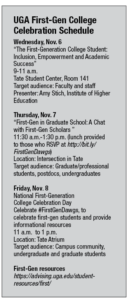
After seeing the fireworks in the acceptance email and feeling emotions he said he could not begin to describe, he was proud his hard work in high school had paid off. In that moment, he knew his life had changed.
“Now and forever, my family, my brothers, my future spouse and children’s lives are going to be changed,” he said. “My family’s entire life has been doing what it takes to get me what I need.”
UGA’s First-Generation College Celebration takes place from Nov. 6-8 to bring faculty, staff and students together in unity as both “first-gens” and first-gen advocates across campus.
The event aligns with National First-Generation Celebration day on Nov. 8, which commemorates the signing of the Higher Education Act of 1965. This act ushered in programs, including federal TRiO programs, aimed at increasing postsecondary access, retention and completion for low-income, potential first-generation college students. While it is the second year of this organized celebration at UGA, it is the inaugural year of bringing a number of departments and student groups together for a campus-wide series of events.
“I’m excited for more first-generation students to be connected and involved as a result of the expanded programming and new campus collaborations for this celebration,” said Lindsay Coco, assistant director for initiatives in the Division of Academic Enhancement and celebration committee leader.
Organizers include the Division of Academic Enhancement, the Graduate School, the Office of Academic Advising Services, the Office of Institutional Diversity, the Office of Transfer Services, the Division of Student Affairs and student representatives from TRiO Student Support Services and #FirstGenDocs.
“From a first-gen supporter perspective, it is amazing to see the talent, experiences and strengths that these students bring with them to UGA,” said Coco. “They are charting the way to college for their families, and this means they have to figure out many things without the same knowledge of college that continuing generation students bring.”
Kuck said that he cannot wait to graduate, get a job and give back to his family for all they have done for him. He said coming to UGA sets a precedent in his hometown of Cochran because it shows high school students that this is something they can achieve if they work hard in their classes.
“When I first came here, I did not know that my parents not going to college put me in a place to use resources for guidance on how to navigate the university,” he said. “After meeting so many incoming first-gens as an orientation leader this summer, I decided to create a first-gen organization to gather them together.”
Still in the founding stages, the organization will serve as a supportive community aimed at professional development, he said.
Both Kuck and student members of the First-Gen Celebration planning committee, like Olamide Ogunjobi, make strides to bring the first-gen community together and equip advocates. Ogunjobi said her family moved from Nigeria with educational opportunities on the forefront of their minds.
“I always knew I was going to go to college, and I applied to UGA,” said Ogunjobi. “It was not until I stepped on campus that I realized what I signed up for. First-gens are hit with the transition a lot harder because we do not have someone in our family to refer to for specific advice and guidance.”
She said she looks forward to the Nov. 7 roundtable session “First-Gen in Graduate School: A Chat with First-Gen Scholars” because each first-gen student has a story.
“These stories are all different, but they have the same rhythm, and I am excited to see how we are connected and how differences can connect people too,” said Ogunjobi. “Together, we can all build our community.”
Beate Brunow, director of academic partnerships and initiatives for the Division of Student Affairs, celebration committee member and a first-gen student herself, said it has been great to see the number of faculty and administrators who were first-gen students participate in UGA’s First-Generation College Celebration.
“We have begun to recognize that first-gen students often do not know what they do not know, and any support we can provide through programs, mentors and dialogue can go a long way in making a difference in the success of these students,” said Brunow, who added that it is important to avoid approaching this population of students from a deficit perspective because first-gen students have so much to offer.
“I hope we can raise awareness about the experiences of first-gen students to both encourage these students to take advantage of the opportunities to connect with mentors and engage in programs that can help them navigate academic expectations and resources,” she said.
The celebrations also are open to continuing generation undergraduates, graduates, postdocs, faculty and staff. On Nov. 6, Amy Stich, assistant professor of higher education, will lead the workshop “The First-Generation College Student: Inclusion, Empowerment and Academic Success” for UGA employees working to earn a certificate of diversity and inclusion from the university. Lisa Sperling, senior director of recruitment and diversity initiatives at the Graduate School, wants UGA’s First-Generation College Celebration to make first-gen students feel appreciated for their achievements, as well as identify advocates and promote existing resources. “We are all in this together,” she said. “We are all Dawgs.
